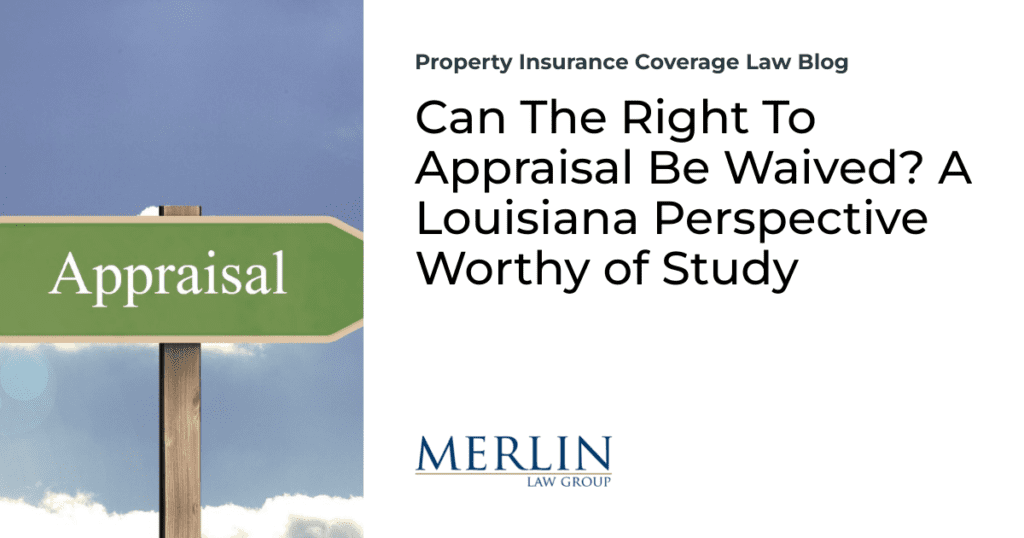Can The Right To Appraisal Be Waived? A Louisiana Perspective Worthy of Study

This morning’s post, Insurance Defense Attorneys Trying To Be The New Appraisal Stars—And Pick Up More Business Doing So, noted that a leading Louisiana insurance defense attorney suggests that insurers should invoke appraisal as a technique to avoid Louisiana law requiring prompt and full payment following claim investigation. This may be a motive in a recent case for an insurer in Louisiana to fight off arguments of waiver to invoke appraisal.1
In a decision last month, Chief Federal Judge Nannette Jolivette Brown in Louisiana stated the issue before her:
Defendant moves the Court to issue an order compelling the parties to submit to the appraisal process as required by the express terms of the insurance policy. Plaintiff opposes the motion and argues that Defendant has waived the right to appraisal by failing to request it within 60 days from receipt of Plaintiff’s February 4, 2022 proof of loss.
Can an insurer waive the right to appraisal by waiting too long to demand it? What is too long in Louisiana?
She noted the policyholder’s argument and facts supporting the waiver:
Plaintiff opposes the motion. Plaintiff points out that on February 4, 2022, he submitted an extensive proof of loss package to Defendant containing evidence supporting a demand for $479,672.47. Additionally, Plaintiff points out that on February 17, 2022, his contractor submitted to Defendant documentation of the roof damage taken during the re-tarping of the roof, which was done at Defendant’s direction. Plaintiff asserts that Defendant ‘was undoubtedly aware by February 20222 that there was a massive dispute as to the amount of loss.’
Plaintiff argues that Defendant had 60 days from receipt of Plaintiff’s February 4, 2022 proof of loss to invoke an appraisal. Since Defendant filed to invoke an appraisal within that timeframe, Plaintiff argues that Defendant has waived the right to compel appraisal. Alternatively, Plaintiff contends that Defendant’s May 31, 2022 appraisal demand was untimely because it was made more than 120 days after the January 28, 2022 inspection. Therefore, Plaintiff argues that Defendant did not invoke the appraisal process within a reasonable time….
She even cited Louisiana precedent relied upon by the policyholder:
Plaintiff relies on W.P. Sevier v. United States Fidelity & Guaranty Company. There, the Louisiana Supreme Court held that an insurer’s failure to demand appraisal within 60 days of receipt of satisfactory proof of loss rendered the demand untimely under the terms of the insurance policy at issue in that case. A provision of the policy stated:
The amount of loss for which this Company may be liable shall be payable sixty days after proof of loss, as herein provided, is received by this Company and ascertainment of the loss is made either by agreement between the insured and this Company expressed in writing or by the filing with this Company of an award as herein provided.
The insurer demanded appraisal after the 60-day time period and before paying anything to the insured under the contract. The Louisiana Supreme Court held that the demand for appraisal was untimely.
Based on this, it would seem the Louisiana policyholder would prevail on the waiver argument. Not so fast, my nerdy insurance friends.
She noted the difference in the policy language:
The loss payment provision of the policy at issue in Sevier is distinguishable from the loss payment provision at issue here. The policy at issue here provides:
Loss will be payable 60 days after we receive your proof of loss and:
1. Reach an agreement with you;
2. There is an entry of final judgment; or
3. There is a filing of an appraisal award with us.
Under Plaintiff’s policy, Defendant must receive proof of loss and one of the three options listed must be satisfied before the clock begins to run on the 60-day payment period. It is undisputed that Plaintiff has not reached an agreement with Defendant, the Court has not entered a final judgment, and there has been no filing of an appraisal award with Defendant. Therefore, this case is distinguishable from Sevier because the loss payment provision’s requirements have not been met.
She then found that the insurer had not waived the right to invoke appraisal:
The adjuster inspected Plaintiff’s property on January 28, 2022, but he was unable to inspect the roof. The adjuster noted that an engineer was needed to inspect the property. The engineer’s report was received on February 17, 2022. On March 1, 2022, the adjuster prepared an estimate, but noted that an additional roof inspection was needed. On April 19, 2022, the roof inspector reported that Plaintiff’s attorney had not allowed a roof inspection. On April 29, 2022, the adjuster completed the report without the requested roof inspection. Defendant then sent Plaintiff a payment for the undisputed damages on May 11, 2022, and it sent an appraisal demand on May 31, 2022. Therefore, Defendant received the adjuster’s final report on April 29, 2022, and it demanded appraisal 32 days later. Considering all these circumstances, the Court concludes that Defendant demanded appraisal within a reasonable time after a dispute as to the amount of loss arose. Accordingly, Defendant has not waived appraisal, and the motion to compel appraisal must be granted because the express terms of the policy require an appraisal.
Who was the lead attorney representing the insurer winning this seemingly unwinnable argument? Matthew Monson. That is why we study and analyze his briefs and techniques.
A Thought After Reading Louisiana Law
All the evils of France have been produced less by the perversity of the wicked and the violence of fools than by the hesitation of the weak, the compromises of conscience, and the tardiness of patriotism. Let every deputy, every Frenchman show what he feels, what he thinks, and we are saved!
—Marquis de Lafayette
1 McMillian v. Safepoint Ins. Co., No. 2:22-cv-01744 (E.D. La. Jan. 10, 2023).



